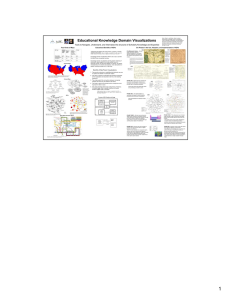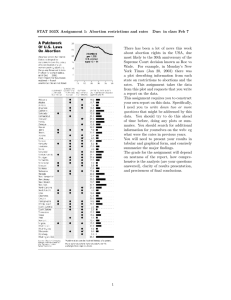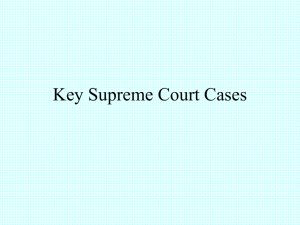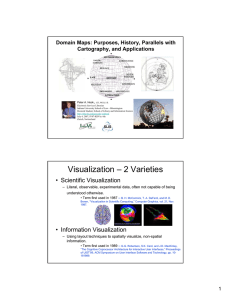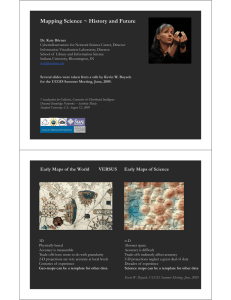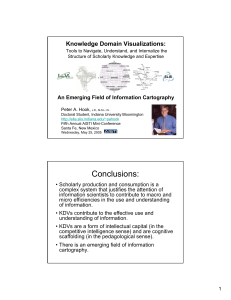The History and Development of Domain Maps:
advertisement
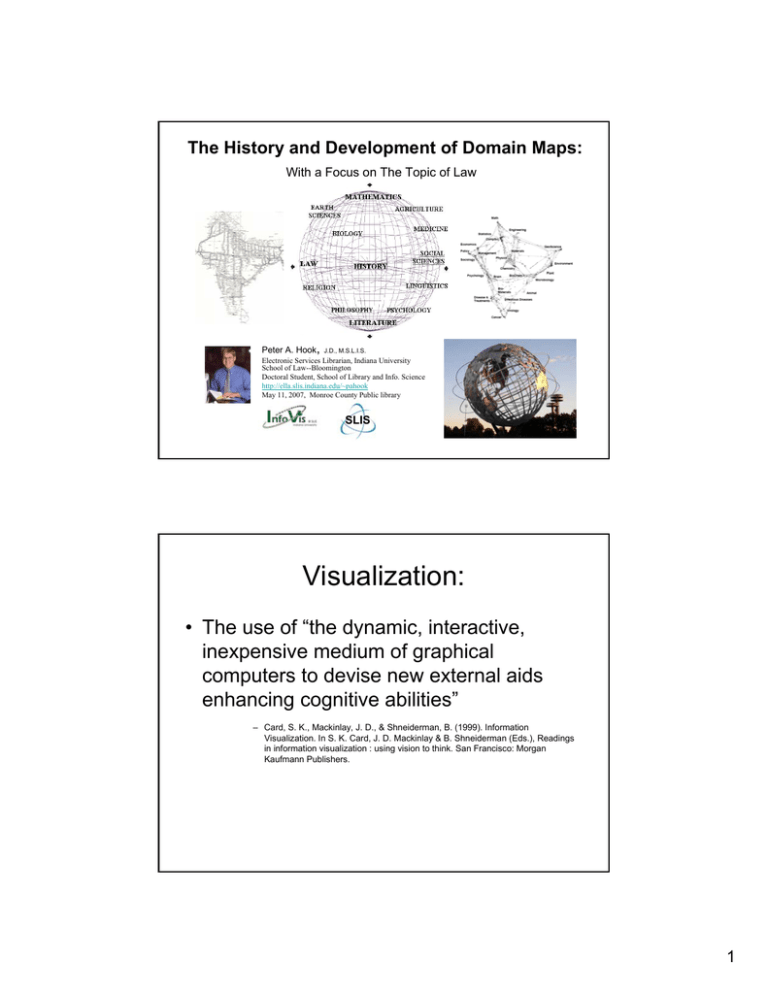
The History and Development of Domain Maps: With a Focus on The Topic of Law Peter A. Hook, J.D., M.S.L.I.S. Electronic Services Librarian, Indiana University School of Law--Bloomington Doctoral Student, School of Library and Info. Science http://ella.slis.indiana.edu/~pahook May 11, 2007, Monroe County Public library SLIS Visualization: • The use of “the dynamic, interactive, inexpensive medium of graphical computers to devise new external aids enhancing cognitive abilities” – Card, S. K., Mackinlay, J. D., & Shneiderman, B. (1999). Information Visualization. In S. K. Card, J. D. Mackinlay & B. Shneiderman (Eds.), Readings in information visualization : using vision to think. San Francisco: Morgan Kaufmann Publishers. 1 2 Varieties • Scientific Visualization – Literal, observable, experimental data not capable of being understood otherwise. • Information Visualization – Using layout techniques to spatially visualize, non-spatial information. Purposes • • • • (1) Discovery (2) Understanding (3) Communication (4) Education These may be collapsed into two general purposes: • (1) Discovery and (2) Explanation 2 Knowledge Domain Visualizations • “Knowledge domain visualizations (KDVs) are the graphic rendering of bibliometric data designed to provide a global view of a particular domain, its structural details, or its salient characteristics (most cited authors or papers, bursting concepts, etc.).” Hook, Peter A. and Börner, Katy. (2005) Educational Knowledge Domain Visualizations: Tools to Navigate, Understand, and Internalize the Structure of Scholarly Knowledge and Expertise. In Amanda Spink and Charles Cole (eds.) New Directions in Cognitive Information Retrieval. Springer-Verlag. • KDVs are also referred to as domain maps and the process of their creation as domain mapping. • Information Cartography • Data Landscapes 3 2005 Information space of 22,000 conference abstracts submitted to the American Association of Geographers (AAG) annual meeting from 1993-2002. Andre Skupin, April 3, 2006, Places and Spaces Exhibit, New York Public Library Science and Business Branch. See: Skupin, A., and Hagelman, R. (2005) Visualizing Demographic Trajectories with SelfOrganizing Maps. GeoInformatica. 9(2). Mapping the Evolution of Co-Authorship Networks in Information Visualization, 1988 - 2004 Ke, Visvanath & Börner, (2004) Won 1st price at the IEEE InfoVis Contest. 8 4 Descriptive Æ Scientific Cartography Prior to the 1600’s cartography was merely descriptive. Advances in calculating location on the planet made it scientific. – Triangulation over large distances from a known base measure. – Using the moons of Jupiter to establish longitude on land. – Using accurate time pieces to establish longitude at sea. – Accurately measuring depth and altitude, and representing them on maps. The same has now occurred with domain mapping. Headrick, Daniel R. (2000). When Information Came of Age: Technologies of Knowledge in the Age of Reason and Revolution, 1700-1850. New York: Oxford University Press. – The descriptive has become methodologically rigorous. 5 1696 • First Accurate Map of the Earth • 40 points of accurate longitude • Based on Moons of Jupiter to compare with local time in Paris. • Cassini. Morrison, Philip and Phylis (1987). The Ring of Truth. New York: Random House. 1939 John D. Bernal was a world renowned physicist, a historian of science, and a sociologist of science. He is considered to have produced one of the first ‘maps’ of science. Bernal, J.D. (1939). The Social Function of Science. London: Routledge & Kegan Ltd. 6 1948 Ellingham, H. J. T. (1948), Divisions of Natural Science and Technology, in Reports and Papers of the Royal Society Scientific Information Conference, 21 June – 2 July, 1948. London: The Royal Society, Burlington House. Distance—Similarity Metaphor 1654 Madeleine de Scudéry (b. 1607-d. 1701), Clélie, histoire romaine, première partie (Clélie: A Roman Story, part I), Paris, 1654, Reserve of Rare and Precious Books, Rés. Yý. 1496 “Carte du tendre (Map of Affection), engraved by François Chauveau and inserted in the first part of the novel. A salon game, the Map sparked a fad for "amorous geography" that took the form of allegorical almanacs and imaginary maps.” From: Creating French Culture: Treasures from the Bibliotheque Nationale de France, Library of Congress, Available at:http://www.loc.gov/exhibits/bnf/bn f0004.html 7 1973 Co – Discoveries / Implementation Using Co-Citation to create domain maps. • Small, H. (1973). Co-citation in the scientific literature: A new measure of the relationship between two documents. JASIS, 24, 265-269. • Marshakova, I.V. (1973). A system of document connections based on references. Scientific and Technical Information Serial of VINITI, 6, 3-8. Map of all Science & Social Science Kevin Boyack Richard Klavans Katy Börner 2005 LIS • The map is derived from the citation linkages between 7,121 journals from the year 2000. Comp Sci Geogr Oper Res Econ Social Sci Comm Sociol Math Hist Elect Eng Mech Eng Geront Psychol Educ Physics Anthrop Radiol Biomed Rehab Nursing Genet Cardio OtoRh Gen/Org Neuro Sci Astro Urol Meteorol Hemat Immun Env Marine GeoSci Ecol Nutr Virol Gastro Plant Ob/Gyn Earth Sciences Paleo Soil Endocr Derm Dentist Chem Eng Polymer Endocr Medicine GeoSci Chemistry BioChem Oncol Ped Surg Fuels Elect Analyt Chem Chem P Chem Env Emerg Gen Med Med Constr CondMat Nuc Pharma Sport Sci Aerosp MatSci Neurol Psychol Psychol • ISI Data (science Boyack, K.W., Klavans, R., & Börner, K. (2005). Mapping the backbone of science. Scientometrics. Vol. 64, No. 3, 351-374 Appl Math AI Stat Health Care citation index and the social science citation index). Robot PolySci Law Dairy Food Sci Pathol Zool Parasit Agric Ophth Vet Med Ento 8 Different Similarity Metrics • 10 different similarity metrics – 6 Inter-citation (raw counts, cosine, modified cosine, Jaccard, RF, Pearson) – 4 Co-citation (raw counts, cosine, modified cosine, Pearson) Inter-citation 1 cites 2 Co-citation 1 and 2 are co-cited 1 3 2 1 2 Boyack, K.W., Klavans, R., & Börner, K. (2005). Mapping the backbone of science. Scientometrics. Vol. 64, No. 3, 351-374 1951 Visualizations (Thurston & Degan) • Factorial / Vector Analysis of Co-Voting • 1943 & 1944 Terms • 9 Vectors (one for each Justice) in 3 dimensions Thurstone, L. L. & Degan, J. W. (1951) A Factorial Study of the Supreme Court, Proceedings of the National Academy of Sciences of the United States of America, Vol. 37, No. 9 (Sept. 15, 1951), 628-635. 9 1985 Diagrams Warren Court (1953 – 1969) Burger Court (1969 – 1986) Spaeth, Harold J. & Altfeld, Michael F. (1985) Influence Relationships within the Supreme Court: A Comparison of the Warren and Burger Courts, The Western Political Quarterly, Vol. 38., No. 1. (March 1985), pp. 70-83. Relational Infrastructure of the Law 10 2006 2007 2000 1997 1992 1988 1989 1990 1986 1983 1979 1979 1980 1981 1976 1977 1975 1971 1972 1973 1965 2006 2007 2000 1997 1992 1988 1989 1990 1986 1983 1979 1979 1980 1981 1976 1977 1975 1971 1972 1973 1965 26 “Abortion and Birth Control” Cases in the S.Ct. = Birth Control = Abortion 26 “Abortion and Birth Control” Cases in the S.Ct. 11 Relational Infrastructure of the Law 12 13 14 1. Griswold v. Connecticut, 381 U.S. 479 (June 07, 1965) vs. “The First Amendment has a penumbra where privacy is protected from governmental intrusion.” – West Publishing “Connecticut law forbidding use of contraceptives unconstitutionally intrudes upon the right of marital privacy.” – West Publishing 15 3. Eisenstadt v. Baird, 405 U.S. 438 (March 22, 1972) vs. Main Opinion Concurrence Dissent Concurrence Took No Part “Massachusetts statute permitting married persons to obtain contraceptives to prevent pregnancy but prohibiting distribution of contraceptives to single persons for that purpose violates equal protection clause.” – West Publishing “Under right of privacy, individual, married or single, has right to be free from unwarranted governmental intrusion into matters so fundamentally affecting a person as decision whether to bear or beget a child.” – West Publishing 4. Doe v. Bolton, 410 U.S. 179 (Jan. 22, 1973) 5. Roe v. Wade, 410 U.S. 113 (Jan. 22, 1973) 16 Concurrence Concurrence Dissent Concurrence Dissent Dissent Main Opinions 7 2 5. Roe v. Wade, 410 U.S. 113 (Jan. 22, 1973) 4k106 Fetal Age and Viability: Trimester “Prior to approximately the end of the first trimester of pregnancy, the attending physician in consultation with his patient is free to determine, without regulation by state, that in his medical judgment the patient's pregnancy should be terminated, and if that decision is reached such judgment may be effectuated by an abortion without interference by the state.” “From and after approximately the end of the first trimester of pregnancy, a state may regulate abortion procedure to extent that the regulation reasonably relates to preservation and protection of maternal health.” “If state is interested in protecting fetal life after viability, it may go so far as to proscribe abortion during that period except when necessary to preserve the life or the health of the mother.” – West Publishing 17 19. Webster v. Reproductive Health Services, 492 U.S. 490 (July 03, 1989) vs. “State's interest in protecting potential human life does not come into existence only at point of viability and thus, there should not be rigid line allowing state regulation of abortion after viability but prohibiting regulation before viability. (Per Chief Justice with two Justices concurring.).” “Today, Roe v. Wade, and the fundamental constitutional right of women to decide whether to terminate a pregnancy, survive but are not secure.” “I fear for the future. I fear for the liberty and equality of the millions of women who have lived and come of age in the 16 years since Roe was decided. I fear for the integrity of, and public esteem for, this Court.” 22. Planned Parenthood of SE Penn. v. Casey, 492 U.S. 490 (June 29, 1992) vs. “Reliance on Roe v. Wade rule's limitation on state power required reaffirmance of Roe's essential holding under doctrine of stare decisis; for two decades of economic and social developments, people organized intimate relationships and made choices that defined their views of themselves and their places in society in reliance on availability of abortion in event of contraceptive failure.” 18 Mania for Co-Voting Data July 2, 2005 New York Times Tushnet, Mark (2005). Taking Sides: Many believe political differences rend the Rehnquist Court. But more than politics are in play. Legal Affairs, March April 2005. Visualizing the Harvard Law Review Supreme Court Statistics July 2, 2005 New York Times 19 Ideological Landscape of the Justices (1994 – 2003) Appointed by a Democrat Appointed by a Republican Voting frequencies represented as the edge weight between nodes and presented visually as a graph. (Rendered with Pajek using a stochastic, spring force algorithm.) Frequency of Voting Blocks in 5-4 Cases (1994 -2003 Supreme Court Terms) 47% 82 17 5 28 16% 17 5 14 8% 17 5 ALL OTHER GROUPINGS OF 5 51 29% (34 different groupings) (Highest repetition – 3 times) 17 5 Total 5 to 4 Cases = 175 Source: Statistics harvested from the Harvard Law Review 20 Thresholding (Voting Together > 50%) Reveals Ideological Cliques Thresholding (Voting Together > 49%) Reveals Ideological Cliques 21 Justices of the United States Supreme Court (1956 – 2004 Terms) © 2006 Peter A. Hook – Spatial distribution based on the percentage of co-voting in Supreme Court opinions. Source: Harvard Law Review (O Method). Rendered with Pajek. Blue border color = appointed by a Democrat. Red border color = appointed by a Republican. 22 The Minnesota Twins Story Two Friends End Up on the Supreme Court 23 1985 Term – Their Last Together 10 0 m3ds$points[, 1:2][,2] 20 30 Stevens White Rehnquist O'Connor Powell Burger Brennan -10 Blackmun Marshall -20 -10 0 10 20 30 m3ds$points[, 1:2][,1] 1970 Term – Their First Together 10 Douglas 0 Harlan Burger Blackmun Marshall Brennan -10 m3ds$points[, 1:2][,2] 20 30 Black White Stewart -20 -10 0 10 20 30 m3ds$points[, 1:2][,1] 24 Aggregate vs. Specific Topics (Potential for different spatial distributions) 20 1994-2003 Non-Unanimous Cases (MDS using R) ohn Paul Stevens Clarence Thomas 0 Ruth Bader Ginsburg David Hacktt Souter Anthony M. Kennedy -10 William H. Rehnquist Stephen G. Breyer Sandra Day O'Connor -20 m3ds$points[, 1:2][,2] 10 Antonin Scalia -40 -20 0 20 40 m3ds$points[, 1:2][,1] 25 1994-2003 Freedom of Speech Cases (MDS using R, O method) 40 William H. Rehnquist 20 Sandra Day O'Connor 0 n3ds$points[, 1:2][,2] Stephen G. Breyer David Hacktt Souter John Paul Stevens Antonin Scalia -20 Ruth Bader Ginsburg Clarence Thomas Anthony M. Kennedy -20 0 20 40 n3ds$points[, 1:2][,1] 2004 Intersecting threads of thought of Keith Nesbitt’s doctoral dissertation. Employing the metro map metaphor. Nesbitt (2004). “Getting to more Abstract Places using the Metro Map Metaphor,” IV’04, 8th International Conference on Information Visualisation London,2004. 26 DC BLOGS • The DC Metro map became a navigational front end to D.C. related blogs. • People self associated with stops both literally based on geography • and metaphorically based on the reputation of the place. • Alas, it died sometime during or after 2005. http://www.reenhead.com/map/metroblogmap.html Thematic Map Gastner, Michael, Shalizi, Cosma, & Newman, Mark (2004). KDVs Boyack, Kevin W., Mane, Ketan K. and Börner, Katy. (2004). Mapping Medline Papers, Genes, and Proteins Related to Melanoma Research. IV2004 Conference, London, UK, pp. 965-971 Concept Map Feather, Ralph M. Jr., Snyder, Susan Leach & Hesser, Dale T. (1993). Concept Mapping, workbook to accompany, Merrill Earth Science. Lake Forest, Illinois: Glencoe. Metro Map Metaphor Nesbitt, Keith V. (2004). Getting to more Abstract Places using the Metro Map Metaphor. (IV’04). IEEE. 27 1988 Shwerwood, M. & Sutton, C. (Eds). (1988). The Physical World. New York: Oxford University Press. Benefits of Domain Maps • Provides a structure or scaffolding that students may use to organize the details of a particular subject. • Information is better assimilated with the student’s existing knowledge. • Visualization enhances recall. • Makes explicit the connections between conceptual subparts and how they are related to the whole. • Helps to signal to the student which concepts are most important to learn. Hook, Peter A. and Börner, Katy. (2005) Educational Knowledge Domain Visualizations: Tools to Navigate, Understand, and Internalize the Structure of Scholarly Knowledge and Expertise. In Amanda Spink and Charles Cole (eds.) New Directions in Cognitive Information Retrieval. Springer-Verlag. 28 Dual Coding Theory of Memory • Humans store textual and visual information in different areas of the brain. (Paivio, 1987; Kulhavey & Stock, 1994). • Visual/spatial images trigger memory of textual elements, and text triggers memory of images and locations. Semantic Network Theory of Learning • Human memory is organized into networks consisting of interlinked nodes. • Nodes are concepts or individual words. • The interlinking of nodes forms knowledge structures or schemas. • Learning is the process of building new knowledge structures by acquiring new nodes. • When learners form links between new and existing knowledge, the new knowledge is integrated and comprehended. Jonassen, D. H., Beissner, K., & Yacci, M. (1993). Structural Knowledge: Techniques for Representing, Conveying, and Acquiring Structural Knowledge. Hillsdale, New Jersey: Lawrence Erlbaum Associates. 29 Neural Theory of Knowledge • Associations between different sensory experiences result from consistent co-activation of different clusters of neurons. • Eventually, these associations become fixed via the “recruitment of neural circuitry linking them.” In a similar process, abstract concepts also become linked. • This gives rise to metaphors in which “highly structured neural ensembles in different regions of the brain” are associated together through repeated co-activation. • All knowledge is built upon a series of ever more complex neural associations. Lakoff, G., & Johnson, M. (2003 (1980)). Metaphors We Live By. Chicago: University of Chicago Press. 2004 Supreme Court Term West Topic Space (Procedural Topics Removed) © 2005 Peter A. Hook 30 PCA, Doctrinal Subjects Aggregated to Law School Course Offerings PUBLIC LAND LAW MARITIME LAW WATER LAW ENVIRONMENTAL LAW SECURITIES REGULATION 0.5 CONSUMER PROTECTION INTELLECTUAL PROPERTY BANKING LAW TAXATION OIL AND GAS LAW PRODUCTS LIABIL LAND USE LAW WORKERS' COMPENSATION TORTS ANTITRUST LAW LABOR LAW PROPERTY LAW NATIVE PEOPLES LAW 0.0 CONTRACTS COMMUNICATIONS LAW HEALTH LAW CREDITORS AND DEBTORS' RIGHTS SECURED TRANSACTIONS INSURANCE LAW BUSINSS ASSOCIATIONS INTERNATIONAL LAW EMPLOYEE BENEFITS LAW MILITARY LAW INTERNATIONAL BUSINESS TRANSACTIONS COMMERCIAL LAW ELECTION LAW CIVIL RIGHTS LAW -0.5 FAMILY LAW NON-PROFIT ORGANIZATIONS WILLS AND TRUSTS IMMIGRATION LAW JUVENILE JUSTICE ESTATE PLANNING EDUCATION LAW CRIMINAL LAW CRIMINAL PROCEDURE ADMINISTRATIVE LAW -1.0 Dimension 4 ENTERTAINMENT LAW CONSTITUTIONAL LAW -0.5 0.0 0.5 1.0 Dimension 3 THE END 31
